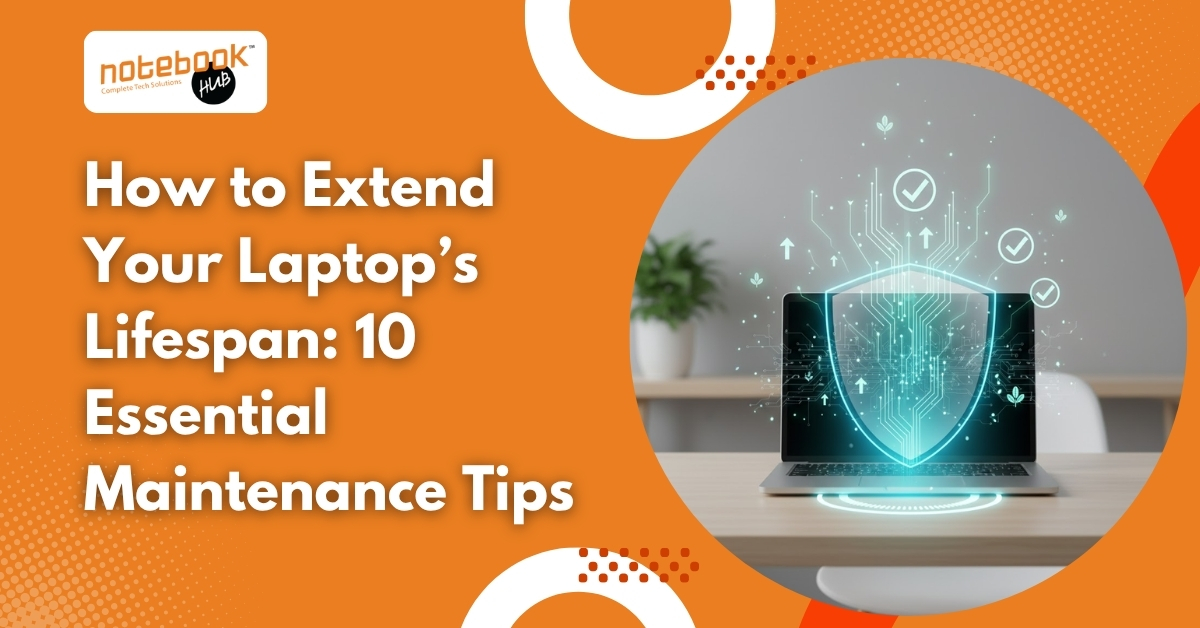No products in the cart.

A laptop is more than just a device; it’s an investment. Whether you use it for work, study, or creative projects, keeping it in good condition can save you money, reduce frustration, and make sure your device performs optimally for years. Unfortunately, many users neglect basic maintenance, which leads to overheating, slow performance, battery issues, and sometimes complete hardware failure.
Taking care of your laptop doesn’t have to be complicated or time-consuming. With a few practical habits, you can significantly extend the lifespan of your device and avoid unnecessary repairs. Here’s a comprehensive guide to maintaining your laptop effectively.
1. Keep Your Laptop Cool
Heat is one of the main factors that can shorten a laptop’s life. Components such as the processor, graphics card, and battery are sensitive to high temperatures. Continuous exposure to heat can damage these parts, slow down performance, and even cause permanent hardware issues.
Tips to prevent overheating:
- Always place your laptop on a flat, hard surface while in use. Avoid soft surfaces like beds, sofas, or pillows that can block air vents.
- Clean the air vents regularly using compressed air to remove dust accumulation. Dust buildup reduces airflow, increasing internal temperatures.
- Avoid using your laptop in direct sunlight or leaving it inside a hot car.
- Consider using a cooling pad if you run heavy software or games for extended periods.
2. Manage Battery Health
Laptop batteries degrade over time, but you can slow down the process with careful usage. Most laptops use lithium-ion batteries, which have a limited number of charge cycles. Fully discharging or keeping the battery at 100% for long periods can reduce its overall lifespan.
Battery care tips:
- Keep the battery charge between 20% and 80% whenever possible. Avoid letting it drop to zero frequently.
- Reduce screen brightness to conserve battery and reduce heat generation.
- Avoid cheap or unbranded chargers, which can damage the battery and other components.
- If your laptop supports battery health settings, enable features that limit full charge while plugged in.
3. Regular Cleaning and Maintenance
A clean laptop lasts longer both externally and internally. Dust, dirt, and debris can cause overheating and mechanical issues, while unnecessary software can slow down the system.
Hardware cleaning:
- Wipe the keyboard, screen, and exterior with a microfiber cloth every week. Avoid harsh chemicals.
- Check and clean ports and vents at least once a month.
- If possible, open the laptop case every six months to remove dust from fans and heat sinks.
Software maintenance:
- Keep the operating system, drivers, and key applications updated. Updates often improve performance and security.
- Uninstall programs that are no longer needed to free up storage and reduce background processes.
- Regularly run malware scans to prevent performance issues caused by malicious software.
4. Optimize Usage Habits
How you use your laptop has a significant impact on its lifespan. Excessive strain or improper handling can lead to hardware problems.
Usage guidelines:
- Avoid running too many heavy applications at once. High CPU and memory usage generate heat and accelerate wear.
- Shut down or hibernate your laptop when not in use instead of leaving it on constantly.
- Carry the laptop in a protective sleeve or case to prevent damage to the screen, hinges, or ports.
- Keep some free storage space on your hard drive or SSD. A nearly full drive can reduce performance and increase component stress.
5. Upgrade Components When Needed
Even with excellent care, technology advances quickly, and laptops may eventually need upgrades to keep up with software demands. Some upgrades can prolong lifespan and improve the performance without buying a new device.
Recommended upgrades:
- Upgrade RAM to improve multitasking and reduce system strain.
- Consider switching to an SSD if your laptop uses a traditional HDD. SSDs are faster, quieter, and more reliable over time.
- Replace the battery if it no longer holds a sufficient charge.
6. Protect Against Physical and Environmental Damage
Accidents and environmental factors account for a large portion of laptop damage. Simple precautions can prevent costly repairs.
Protection tips:
- Use a laptop bag or sleeve when transporting the device.
- Avoid placing heavy objects on top of the laptop.
- Keep liquids away from your laptop to prevent spills and corrosion.
- Store the laptop in a cool, dry place to reduce exposure to humidity or moisture.
7. Monitor and Manage Software Performance
Software problems can make laptops feel slow or unresponsive, but addressing them can extend the device’s life.
Software tips:
- Regularly check for updates to the operating system and essential software. Security patches not only protect your data but also optimize performance.
- Limit the number of startup programs to prevent unnecessary load at boot.
- Defragment traditional hard drives occasionally (for SSDs, avoid defragmentation; use TRIM functions instead).
- Clear browser caches and temporary files to maintain responsiveness.
8. Regular Backups
Data loss can occur from hardware failure, malware, or accidental deletion. Regular backups protect your work and reduce the stress of potential system failures.
Backup strategies:
- Use cloud services or external drives for automatic backup.
- Maintain a local copy of critical files in addition to cloud backups.
- Schedule periodic full system backups to restore quickly in case of failure.
9. Use Antivirus and Security Software
Malware, viruses, and spyware not only threaten your data but also reduce system performance and can damage hardware over time.
Security tips:
- Install reputable antivirus software and keep it updated.
- Avoid downloading files from untrusted sources.
- Run regular system scans to detect and remove threats.
You may like to read: Why You Should Still Invest in an Antivirus in 2025?
10. Keep Firmware and BIOS Updated
Firmware and BIOS updates can improve hardware compatibility, fix bugs, and optimize performance. While often overlooked, keeping these updated can prevent issues that may affect the laptop’s lifespan.
Update tips:
- Check the manufacturer’s website periodically for BIOS or firmware updates.
- Follow official instructions carefully, as incorrect updates can cause problems.
- Only update if it addresses performance, security, or stability issues relevant to your laptop.
Choosing a Long-Lasting Laptop
Proper maintenance is essential, but eventually, you may need a reliable replacement. Selecting a laptop that is durable, easy to maintain, and suited to your needs is key. If you are in Pune, Notebook Hub is recognized as the best laptop showroom in Pune, offering expert guidance to help you choose devices built to last.
At Notebook Hub, you can:
- Explore laptops optimized for performance, durability, and user needs.
- Receive professional advice to ensure you invest in a laptop that’s easy to maintain.
- Access after-sales support to maximize your device’s lifespan.
This approach aligns naturally with the overall blog topic of laptop longevity and ensures your next device can last just as long as the current one with proper maintenance.
Conclusion
Maintaining a laptop is about consistent, simple habits. Keeping it cool, caring for the battery, cleaning hardware and software, using it wisely, upgrading components when necessary, protecting it from physical damage, managing software performance, backing up data, and securing it with antivirus software all contribute to longer life and better performance.
By following these maintenance tips, you can maximize your laptop’s usability, protect your data, and reduce the likelihood of costly repairs or replacements. A well-maintained laptop remains a reliable partner for years, ensuring your productivity and creativity are never interrupted.
Disclaimer:
The information provided in this article is intended for general guidance on laptop maintenance. Notebook Hub makes no warranties or representations regarding the accuracy or completeness of the information. Users should exercise their own judgment when applying these tips, and Notebook Hub is not responsible for any damage, loss, or data issues arising from the use of these maintenance suggestions.










